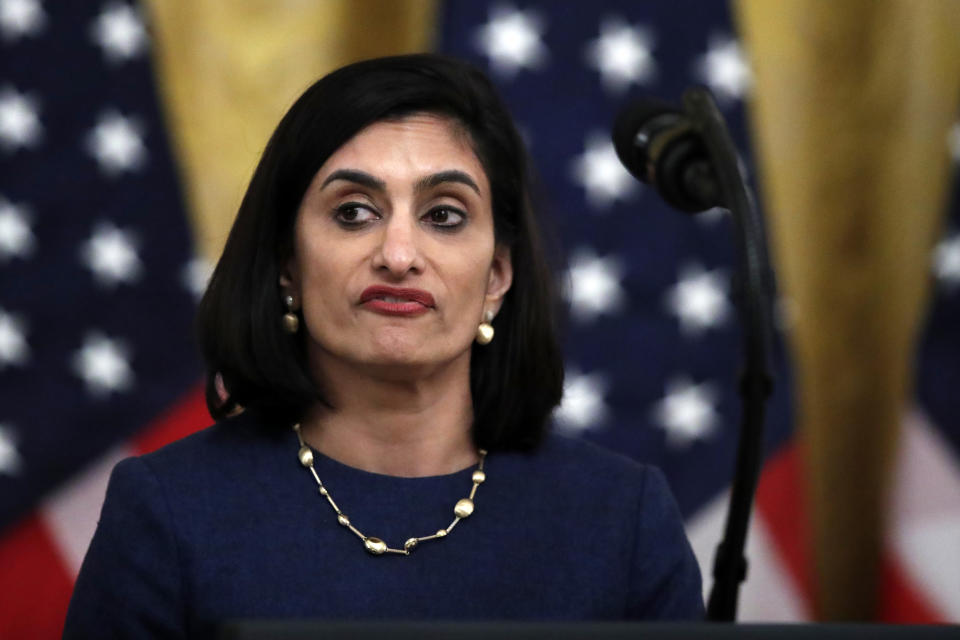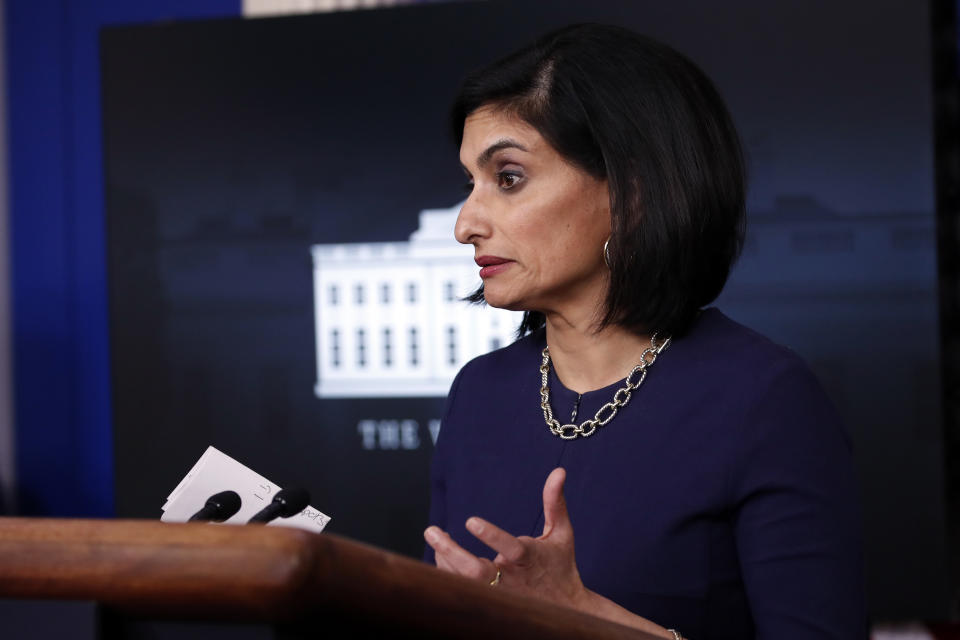Watchdog report faults Medicare agency's contract management
WASHINGTON (AP) — The head of the Medicare and Medicaid programs failed to properly manage more than $6 million in communications and outreach contracts, giving broad authority over federal employees to a Republican media strategist she worked with before joining the Trump administration, a government watchdog said in a report to be released Thursday.
Seema Verma, administrator of the Centers for Medicare and Medicaid Services, and other agency leaders did not administer the contracts “in accordance with federal requirements,” according to the inspector general at the Department of Health and Human Services. CMS is part of the department.
The contracts, which are no longer active, were for strategic communications services, such as public engagement and interacting with the media. But the inspector general said CMS used them as personal services contracts and exerted a level of control over the contractors' work that exceeded what's allowed under that type of a federal award.
Verma sharply disputed the inspector general's findings. In a response that accompanies the report, she said CMS has “deep concerns" with the conclusions, which “are based on unsubstantiated assumptions and incomplete analysis." She also said the report relies on mischaracterizations of contractor tasks and duties and misrepresents federal acquisition rules.
Verma, a protege of Vice President Mike Pence, came to the Trump administration after designing Indiana’s Medicaid expansion when Pence was governor of that state.
As head of CMS, Verma has enjoyed strong support from the White House but has clashed with health secretary Alex Azar. Congressional Democrats are wary of her, since she was a supporting player in President Donald Trump’s failed effort to repeal and replace the Obama-era Affordable Care Act.
The GOP media strategist is identified throughout the report by the pseudonym “Brian Smith.” Smith is described as a subcontractor who Verma trusted and had worked with her at the health care consulting firm she ran in Indianapolis.
A government official familiar with the matter confirmed that Smith is Marcus Barlow, who was spokesman for Verma’s firm, SVC Inc. The official was not authorized to speak publicly and requested anonymity.
Barlow joined the public relations firm Nahigian Strategies in March 2017, according to the report. Barlow did not return calls seeking comment. Nahigian Strategies was a subcontractor on all three of the contracts.
Federal acquisition regulation prohibits contracts from being used for the performance of inherently governmental functions, but the report cited multiple examples where Barlow did that.
Barlow regularly attended meetings with Verma and her staff at CMS and often relayed information and directions to agency employees that the administrator had directly communicated to him, the report said. He was also authorized to “clear social and media responses” when the agency's deputy administrator and deputy chief of staff were away.
Two examples from 2017 point to Verma's reliance on Barlow. In one, she said a speech needed “a lot of work” and told him to “get with the technical people asap” so a draft would be ready at the end of the day. In another, she emailed him and two other senior CMS officials about scheduling important agency business.
“This type of responsibility granted to ‘Brian Smith' — that was equal in nature to the same responsibility provided to a CMS senior leader — suggested that 'Brian Smith' had the authority to make CMS management decisions and thus was performing an inherently governmental function,” the inspector general's report said.
Verma said in her response that there's insufficient evidence to back up the report's assertion a subcontractor was performing inherently governmental work. It's disingenuous, she added, to say individual contractors were directing agency officials “when all that is shown is typical collaboration among team members.”
HHS spokesman Michael Caputo said in a separate statement that the inspector general found no fault with how the contracts were awarded “despite attempts by some in the media and highly-partisan members of Congress to make a mountain out of molehill.” He didn't name the media outlets or the lawmakers.
Verma's agency regulates the health care system and sets payment policies for Medicare, so it’s at the crossroads of many issues in the coronavirus pandemic, from the high death toll in nursing homes to the expansion of telehealth services to help patients avoid exposure to the virus. She has been a featured participant at White House coronavirus briefings.
Verma’s expansion of Medicare telehealth services may well be her most lasting accomplishment. Lawmakers of both parties want to see a broader role for telemedicine in the program after the COVID-19 pandemic. Early on in the outbreak, Verma loosened Medicare payment rules to allow greater access to telehealth as a way to keep seniors from risking exposure by having to go to the doctor’s office.
Her biggest reversal came on Medicaid work requirements. The Trump administration had opened the way for states to impose work requirements on “able-bodied” low-income adults as a condition of keeping their health insurance. But courts slapped down the administration’s move, ruling that work requirements could cause people to lose coverage, and that violated Medicaid’s core purpose.


